|
|
|
Sort Order |
|
|
|
Items / Page
|
|
|
|
|
|
|
| Srl | Item |
| 1 |
ID:
105232


|
|
|
|
|
| Publication |
2011.
|
| Summary/Abstract |
The application of psychological perspectives to international studies (IS) is an area of growing research. This review provides a brief overview of interdisciplinary scholarship on psychology in IS, with a particular description of its application to examining traumatic stress. Psychological variables and methods can help IS to achieve greater explanatory power. Using a variety of methods such as surveys, simulations, and case studies to investigate psychological constructs in the international context can overcome the limitations of relying on any single approach. Several psychological constructs with potential applicability to understanding traumatic stress in particular are discussed to illustrate the application and limitations of psychological perspectives in IS. With so many theories and methods, psychology offers rich future possibilities for novel ways to examine IS.
|
|
|
|
|
|
|
|
|
|
|
|
|
|
|
|
| 2 |
ID:
118015
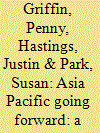

|
|
|
|
|
| Publication |
2013.
|
| Summary/Abstract |
As one of the preeminent academic conferences on international studies in the Asia Pacific, the 2012 Oceanic Conference on International Studies, held at the University of Sydney (with co-sponsors at the University of New South Wales, the University of Technology, Sydney, and Macquarie University) from 18 to 20 July, played host to a large number of academics and international analysts who presented research on a variety of international studies topics. After a very successful conference in Auckland that emphasized the connection of the OCIS community to the Oceanic region, it seemed fitting that the conference would come to Sydney, the largest city in the Oceanic region, and one of the premier global cities in the Asia Pacific. In part because of the location of the conference, and because of the emphasis of many of the conference presentations on the Asia Pacific, no doubt inspired by underlying trends that are both exciting and worrying (sometimes at the same time), the organizers decided to focus this special issue of Global Change, Peace and Security on the challenges that the Asia Pacific faces, now and in the future. In short, this special issue is about the Asia Pacific going forward.
|
|
|
|
|
|
|
|
|
|
|
|
|
|
|
|
| 3 |
ID:
090255
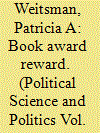

|
|
|
|
|
| Publication |
2009.
|
| Summary/Abstract |
I spent the spring and summer of 2007 reading 185 books in the field of international relations, as I chaired two major book awards in the field.
|
|
|
|
|
|
|
|
|
|
|
|
|
|
|
|
| 4 |
ID:
087283
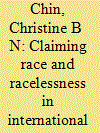

|
|
|
| 5 |
ID:
072302


|
|
|
|
|
| Publication |
2006.
|
| Summary/Abstract |
There is a growing debate over the extent of consensus or divergence found within interdisciplinary International Studies (IS) programs. Unfortunately, with a few exceptions, this debate has taken place in the absence of empirical data. This article advances our understanding of the current state of IS curricula through an analysis of data generated from a survey of 140 interdisciplinary undergraduate IS majors across the United States. The surveyed programs comprise 63 Doctoral/Research institutions, 40 Master's institutions, and 37 Baccalaureate institutions found in 38 states and the District of Columbia. The 140 programs are analyzed in terms of six basic components: introductory course(s), research methods, capstone course(s), area and/or thematic concentrations, study abroad, and foreign language requirements. The findings demonstrate significant areas of both consensus and divergence in IS programs.
|
|
|
|
|
|
|
|
|
|
|
|
|
|
|
|
| 6 |
ID:
108234
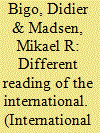

|
|
|
| 7 |
ID:
051628
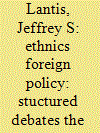

|
|
|
| 8 |
ID:
076523
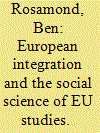

|
|
|
|
|
| Publication |
2007.
|
| Summary/Abstract |
This article takes the 50th anniversary of the Treaty of Rome as an opportunity to reflect upon half a century of academic discourse about the EU and its antecedents. In particular, it illuminates the theoretical analysis of European integration that has developed within political science and international studies broadly defined. It asks whether it is appropriate to map, as might be tempting, the intellectual `progress' of the field of study against the empirical evolution of its object (European integration/the EU). The argument to be presented here is that while we can, to some extent, comprehend the evolution of academic thinking about the EU as a reflex to critical shifts in the `real world' of European integration (`externalist' drivers), it is also necessary to understand `internalist' drivers of theoretical discourse on European integration/the EU. The article contemplates two such `internalist' components that have shaped and continue to shape the course of EU studies: scholarly contingency (the fact that scholarship does not proceed with free agency, but is bound by various conditions) and disciplinary politics (the idea that the course of academic work is governed by power games and that there are likely significant disagreements about best practice and progress in a field). In terms of EU studies, the thrust of disciplinary politics tends towards an opposition between `mainstreaming' and `pluralist versions' of the political science of EU studies. The final section explores how, in the face of emerging monistic claims about propriety in the field, an effective pluralist political science of the EU might be enhanced.
|
|
|
|
|
|
|
|
|
|
|
|
|
|
|
|
| 9 |
ID:
132314
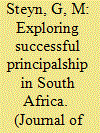

|
|
|
|
|
| Publication |
2014.
|
| Summary/Abstract |
In line with international studies, this study reports in a case study how a South African school principal succeeded in sustaining leadership despite the challenges South African schools experience, and how the principal's leadership practice related to core leadership practices required for a school principal to be successful. Data were collected by means of open-ended interviews with the principal and his staff. The following main themes were constructed: (1) Personal traits; (2) Leadership style; and (3) Ability to sustain and improve development. Secondary empirical data from previous studies in the school supported the findings in this study. The findings of this case study have implications for South African school principals: (1) principals need to be fully committed to improve the quality of learning in schools; (2) they need to be skilful in effectively using available resources; (3) successful principalship develops over time and requires a clear vision, optimism, high performance expectations and acting with care and integrity to nurture trust among role players
|
|
|
|
|
|
|
|
|
|
|
|
|
|
|
|
| 10 |
ID:
095627


|
|
|
| 11 |
ID:
126696
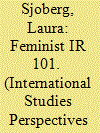

|
|
|
|
|
| Publication |
2013.
|
| Summary/Abstract |
This article discusses the pedagogical potential of a series of blog posts called "Feminist IR 101," which I wrote and posted on Duck of Minerva (duckofminerva.blogspot.com) over the course of 2010 and 2011. As our students increasingly rely on the internet as a source of not only news but knowledge and opinions, this group of posts looks to reach our student audience (and perhaps even others in the discipline) differently than textbooks or other traditional materials. They were meant to be an introduction to feminist IR in the true sense of the word-what feminist IR is, the vocabulary it uses, how it is useful in analysis, and why it is meaningful to scholars and students of gender and global politics. Their goal is to account for both what a feminist perspective contributes to the study of global politics and why I chose to do my research from that perspective. This short article looks specifically at both the "Feminist IR 101" project and its potential classroom uses, as well as the pedagogical value of blogging feminist IR more generally.
|
|
|
|
|
|
|
|
|
|
|
|
|
|
|
|
| 12 |
ID:
097844
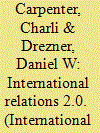

|
|
|
|
|
| Publication |
2010.
|
| Summary/Abstract |
The International Relations (IR) profession has not fully taken stock of the way in which user-driven information technologies-including Blogger, Facebook, Twitter, YouTube, and Wikipedia-are reshaping our professional activities, our subject matter, and even the constitutive rules of the discipline itself. In this study, we reflect on the ways in which our own roles and identities as IR scholars have evolved since the advent of "Web 2.0": the second revolution in communications technology that redefined the relationship between producers and consumers of online information. We focus on two types of new media particularly relevant to the practice and the profession of IR: blogs and social networking sites.
|
|
|
|
|
|
|
|
|
|
|
|
|
|
|
|
| 13 |
ID:
138930
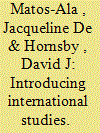

|
|
|
|
|
| Summary/Abstract |
There is a popular perception that large classes result in low levels of student motivation, satisfaction, and engagement. In International Studies (IS) programs, this suggests a challenge for getting students to understand and connect with complex theoretical concepts used to deconstruct the international system and can affect the overall quality of the academic experience. The present study offers insight into how to cope with large IS classes, promoting student engagement through adjusting teaching and assessment methods. Based on the results of two surveys, the Introduction to International Relations course at the University of the Witwatersrand appears to have been successful in promoting student engagement. Focusing on interactive teaching and assessment strategies that promote critical thinking and instill deep learning offers colleagues presented with large classes a chance to establish a vibrant learning environment.
|
|
|
|
|
|
|
|
|
|
|
|
|
|
|
|
| 14 |
ID:
159417
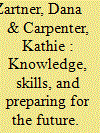

|
|
|
|
|
| Summary/Abstract |
Higher education is at a point of transition. Colleges and universities are considering new ways to attract students through innovative programs that stay true to their educational mission and also prepare students for the current job market. Employers consistently talk about the skills they need in graduates they hire, including critical thinking, strong writing, adaptability, and cultural competency. International studies as a major is perfectly poised to provide students with both the academic grounding they need to better understand the world around them and the skills necessary to make them desirable to employers. Communicating the skills and content that coursework in the major offers, however, is often not a straightforward process. Students have both skills and content knowledge, but two key issues need to be addressed: (1) how can faculty better communicate to students the skills and knowledge we want them to gain from our classes, and (2) how do we enable students to understand and articulate these skills to future employers? This article addresses these questions by examining the contributions of international studies with regard to building skills in the classroom, enhancing cultural competency, promoting language training, developing networking capacity, and preparing students for life after college.
|
|
|
|
|
|
|
|
|
|
|
|
|
|
|
|
| 15 |
ID:
076503
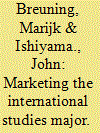

|
|
|
| 16 |
ID:
105233
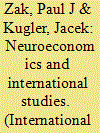

|
|
|
|
|
| Publication |
2011.
|
| Summary/Abstract |
Nearly all political choices depend on trust-or a lack thereof. In world politics, successful negotiations, arms agreements, and deterrence postures all depend on trust. This paper reviews recent findings in neuroeconomics that have identified the neuroactive hormone oxytocin as a key brain mechanism that causes people to trust strangers. This research has also identified the physiologic and behavioral effect of distrust. A neurologically informed formal model of trust is introduced and implications are drawn from it for international studies (IS). We contend that findings in neuroscience and neuroeconomics can be used by social scientists to deepen their understanding of processes such as foreign policy decision making.
|
|
|
|
|
|
|
|
|
|
|
|
|
|
|
|
| 17 |
ID:
164640
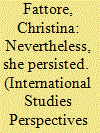

|
|
|
|
|
| Summary/Abstract |
The Women's Caucus for International Studies and the ISA Committee on the Status of Women conducted a survey of the membership concerning the effects of gender on members’ professional and personal lives in November and December 2015. Other iterations of this survey using similar questions were conducted in 1995 and 2006. A plurality of women and a majority of men responded that things have gotten better for women in the discipline. However, using more specific questions and asking for open responses, the survey uncovered that men and women still have very different experiences within the discipline and that the chilly climate continues to persist in international relations. The 2015 survey reveals continued concerns regarding the tension between familial responsibilities and the academic environment, overt and structural discrimination, and the perception of “reverse discrimination” against men.
|
|
|
|
|
|
|
|
|
|
|
|
|
|
|
|
| 18 |
ID:
118167
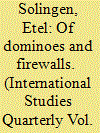

|
|
|
|
|
| Publication |
2012.
|
| Summary/Abstract |
The Great Recession, Euro contagion, Middle East upheavals, nuclear proliferation, and expansion of rights, among others, highlight the centrality of diffusion to international studies. This Presidential Address outlines building blocks for a shared conceptualization of diffusion that is attentive to the initial stimulus; the medium through which information about the stimuli may/may not travel to other destinations; the political agents un/affected by the stimulus' positive or negative externalities, who aid or block the stimulus' journey to other destinations; and outcomes that enable discrimination among grades of diffusion and resulting equilibria. Various issue areas illustrate how initial stimuli may/may not change preferences, transform identities, trigger emotions, alter strategic choices, and affect outcomes. I advance three related considerations. First, to avoid selection bias, understanding what does not diffuse (the "Vegas counterfactual") should be as central as what does. Concepts such as firewalls and sedimentation are essential for gauging a medium's relative immunity/vulnerability to diffusion. Second, weaving domestic, regional, and global considerations into a single analytical framework reduces omitted variable bias and enables systematic cross-regional comparisons. Third, these building blocks imbue the study of diffusion with political dynamics-entailing strategic interaction, contingency, incomplete information, and unintended effects-that defy determinism, automaticity, or teleology. Similar causal mechanisms may yield different outcomes under different domestic, regional, and global conditions. And different mechanisms may yield similar outcomes under comparable circumstances. I highlight the challenges inherent in assessing the outcomes of diffusion given competing empirical findings, epistemologies, and normative readings of what does/does not and should/should not diffuse, and outline an agenda for future research.
|
|
|
|
|
|
|
|
|
|
|
|
|
|
|
|
| 19 |
ID:
092393
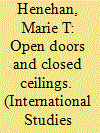

|
|
|
|
|
| Publication |
2009.
|
| Summary/Abstract |
In 1995, the Gender Research Committee of the International Studies Association conducted a survey of the membership concerning the impact of gender on members' lives. In 2006, the Women's Caucus for International Studies sponsored a follow-up survey utilizing similar questions. A comparison of the findings of the two studies shows increased representation of women within international studies, persistent frustration with the slow pace of progress in women's access to senior positions and in accommodating family issues, some evidence of a chilly climate for women and a leaky pipeline, and significant differences between men's and women's perceptions of the status of women in the profession. The 2006 survey reveals a marked increase in concerns regarding the tension between women's family responsibilities and the academic environment, identification of structural discrimination, and concerns that men have been disadvantaged by affirmative action for women.
|
|
|
|
|
|
|
|
|
|
|
|
|
|
|
|
| 20 |
ID:
152339
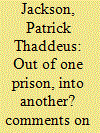

|
|
|
|
|
| Summary/Abstract |
This intervention, while highlighting points of agreement with Rosenberg’s arguments, also challenges Rosenberg’s characterization of the discipline. Specifically, this short intervention takes issue with the image of the field as International Relations as a discipline and multiplicity as its proposed core notion.
|
|
|
|
|
|
|
|
|
|
|
|
|
|
|
|
|
|
|
|
|